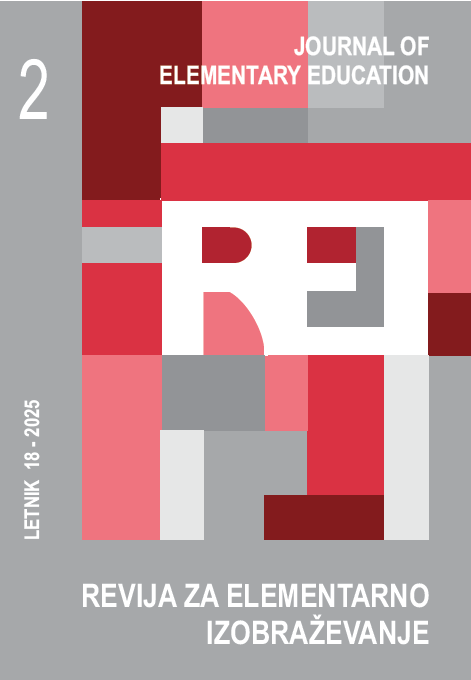Dojemanje vrstniških povratnih informacij učencev v nižjih razredih osnovne šole
DOI:
https://doi.org/10.18690/rei.3773Ključne besede:
poučevanje, šola, učenec, učni proces, vrstniška povratna informacija.Povzetek
V prispevku so predstavljeni rezultati raziskave, izvedene s sedemnajstimi učenci, in sicer od prvega do četrtega razreda osnovne šole. Cilj je bil preveriti dojemanje in ocene učencev o pomenu vrstniške povratne informacije in načinih izvajanja vrstniške povratne informacije. V prispevku je poudarjena potreba po ozaveščanju osnovnih veščin, ki so potrebne za učinkovito povratno informacijo vrstnikov – razvoj kritičnega mišljenja, vrednotenja, sposobnosti opazovanja, komunikacijskih veščin, razvoj empatije, samozavesti, razvoj spoštovanja do drugih.
Prenosi
Literatura
Adachi, C., Tai, J. H.-M., & Dawson, P. (2017). Academics’ perceptions of the benefits and challenges of self and peer assessment in higher education. Assessment and Evaluation in Higher Education, 43(2), 294–306.
Brajković, S., & Žokalj, G. (2021). Učenje u tijeku – kako formativnim vrednovanjem potaknuti učenje [Learning in progress: how to stimulate learning through formative assessment]. Alfa.
Braun, V., & Clarke, V. (2006). Using thematic analysis in psychology. Qualitative Research in Psychology 3(2), 77–101.
Chang S.-C., & Wongwatkit, C. (2023). Effects of a peer assessment-based scrum project learning system on computer programming’s learning motivation, collaboration, communication, critical thinking, and cognitive load. Education and Information Technologies, 8(24), 1–24. https://doi.org/10.1007/s10639-023-12084-x.
Chen, J., Li, J., Jiang, H., Yu, J., Wang, H., Wang, N., Chen, S., Mo, W., Wang, P., Tanguay, R. L., Dong, Q., & Huang, C. (2021). Developmental co-exposure of TBBPA and titanium dioxide nanoparticle induced behavioral deficits in larval zebrafish. Ecotoxicology and environmental safety, 215, 112176. https://doi.org/10.1016/j.ecoenv.2021.112176
Cheong, C. M., Luo, N., Zhu, X., Lu, Q., & Wei, W. (2023). Self-assessment complements peer assessment for undergraduate students in an academic writing task. Assessment & Evaluation in Higher Education, 48(1), 135-148. https://doi.org/10.1080/02602938.2022.2069225.
Creswell, J. W. (2012). Educational Research: Planning, Conducting, and Evaluating Quantitative and Qualitative Research. Pearson.
Jurjević Jovanović, I., Rukljač, I., & Viher, J. (2020). Vrednovanje u razrednoj nastavi [Evaluation in classroom teaching]. Školska knjiga [Schoolbook].
Jurjević Jovanović, I., Rukljač, I., & Viher, J. (2022). Vrednovati je lako [Evaluating is easy]. Školska knjiga [Schoolbook].
Lerchenfeldt, S., Kamel-ElSayed, S., Patino, G., Loftus, S., & Thomas, D. M. (2023). A Qualitative Analysis on the Effectiveness of Peer Feedback in Team-Based Learning. Medical Science Educator, 33(1), 893–902.
Levine, S. C., Suriyakham, L. W., Rowe, M. L., Huttenlocher, J., & Gunderson, E. A. (2010). What counts in the development of young children’s number knowledge? Developmental Psychology, 46(5), 1309–1319.
Lincoln, Y. S., & Guba, E. G. (2013). The Constructivist Credo. Routledge.
Lloyd, B. P., Weaver, E. S., & Staubitz, J. L. (2016). A Review of Functional Analysis Methods Conducted in Public School Classroom Settings. Journal of Behavioral Education 25(3), 1–24. https://doi.org/10.1007/s10864-015-9243-y.
Matošević, A. (2020). Vrednovanje u sklopu programa škola za život: istraživanje zadovoljstva nastavnika [The Aspect of Assessment in the School for Life Program: Teacher Satisfaction Research]. (186:415746), [Master’s thesis, University of Rijeka, Faculty of Humanities and Social Sciences]. https://urn.nsk.hr/urn:nbn:hr:186:415746
Orlich, D., Harder, R., Callahan, R., Trevisian, M., & Brown, A. (2010). Teaching Strategies. Cengage Learning.
Panadero, E., Brown, G. L., & Strijbos, J.-W. (2016). The future of student self-assessment: a review of known unknowns and potential directions. Educational Psychology Review, 28(1), 803–830. https://doi.org/10.1007/s10648-015-9350-2
Patchan, M. M., Schunn, C. D., & Clark, R. J. (2017). Accountability in peer assessment: examining the effects of reviewing grades on peer ratings and peer feedback. Studies in Higher Education, 43(12), 2263–2278.
Patton, M. Q. (2015). Qualitative Evaluation and Research Methods. Sage.
Serrano-Aguilera, J. J., Tocino, A., Fortes, S., Martín, C., Mercadé-Melé, P., Moreno-Sáez, R., Muñoz, A., Palomo-Hierro, S., & Torres, A. (2021). Using peer review for student performance enhancement: Experiences in a multidisciplinary higher education setting. Education Sciences, 11(2), 71–92.
Staubitz, T., Petrick, D., Bauer, M., Renz, J., & Meinel, C. (2016). Improving the peer assessment experience on MOOC platforms. Association for Computing Machinery, 10(16), 389–398. https://doi.org/10.1145/2876034.2876043
Šalković, S., Žiljak, V., & Sikirica, N. (2018). Samovrednovanje i ocjenjivanje korištenjem web tehnologija [Self-evaluation and grading by using web technology]. Polytechnic & Design, 6(3), 199–206.
Wijnia, L., Giel, L. I. S., & Noordzij, G. (2022). The role of psychology students’ motivational profiles in a problem-based learning curriculum. Paper presented at the American Educational Research Association. https://doi.org/10.3102/1894007
Xue, S., Xue, X., Son, Y. J., Jiang, Y., Zhou, H., & Chen, S. (2023). A data-driven multidimensional assessment model for English listening and speaking courses in higher education. Language, Culture and Diversity, 8(1), 1-11. https://doi.org/10.3389/feduc.2023.1198709
Yin, R. K. (2016). Qualitative Research from Start to Finish, Second Edition. The Guilford Press.
Prenosi
Objavljeno
Številka
Rubrika
Licenca
Avtorske pravice (c) 2025 Marija Sablić, Ana Mirosavljević, Ana Maria Marinac

To delo je licencirano pod Creative Commons Priznanje avtorstva 4.0 mednarodno licenco.
